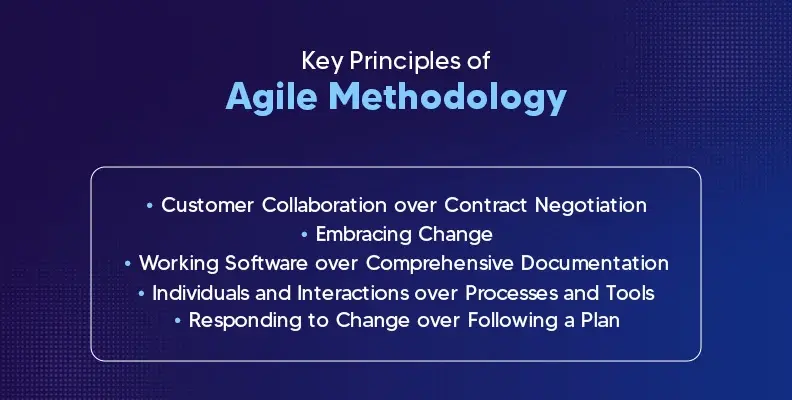Loading.....
Understanding Agile Methodology In Software Engineering

In the rapidly evolving landscape of software development, the Agile methodology has emerged as a beacon of innovation, efficiency, and adaptability. Its profound impact on the software engineering landscape has revolutionized the way teams approach complex projects, fostering a culture of collaboration, iterative development, and customer-centricity.
Change isn't a roadblock; it's an opportunity. Agile teams fully embrace the inevitability of change, considering it a chance to enhance the end product. They are well-prepared to integrate changes seamlessly at any stage of development, resulting in a more adaptable, customer-centric final product. Let’s go ahead and learn more about agile methodology in software development.
What is Agile Methodology?
Agile methodology, fundamentally, is a collaborative approach to software development that emphasizes flexibility, adaptability, and customer satisfaction. Unlike traditional methods that follow a linear, sequential approach, Agile embraces an iterative and incremental process that encourages cross-functional teams to work in short cycles, known as sprints, to deliver high-quality products efficiently. It values customer feedback, adapts to changes, and promotes continuous improvement throughout the development lifecycle.
Key Principles of Agile Methodology

- Customer Collaboration over Contract Negotiation: Agile prioritizes customer satisfaction by fostering regular communication and collaboration between development teams and stakeholders. This ensures that the final product meets the customer's evolving needs and expectations.
- Embracing Change: Agile teams understand that change is inevitable and view it as an opportunity to enhance the end product. They are equipped to incorporate changes at any stage of the development process, leading to a more adaptable and customer-focused final product.
- Working Software over Comprehensive Documentation While documentation is essential, Agile methodology prioritizes delivering functional software over extensive documentation. This approach accelerates the development process and allows teams to focus more on building and testing software that aligns with the customer's requirements.
- Individuals and Interactions over Processes and Tools: Agile methodology places great emphasis on the value of individuals and their interactions within a development team. It fosters a collaborative environment where team members can share their insights, discuss challenges, and collectively contribute to the project's success.
- Responding to Change over Following a Plan: Instead of rigidly adhering to a predefined plan, Agile encourages teams to remain responsive to change throughout the development cycle. This dynamic approach enables teams to adapt quickly to market shifts, technological advancements, and evolving customer preferences.
Benefits of Implementing Agile Methodology

Embrace the power of Agile methodology for your project's success. Experience enhanced flexibility, improved quality, and faster time-to-market, all while ensuring increased customer satisfaction and cost-efficient development. Agile's adaptable nature is your key to staying ahead in a competitive market. Here are some benefits of implementing Agile development:
- Enhanced Flexibility and Adaptability: Agile allows teams to respond quickly to changes, reducing the time and effort spent on restructuring the entire project. This flexibility ensures that the final product remains relevant and aligned with the customer's expectations.
- Improved Quality and Transparency: With continuous testing and customer feedback, Agile promotes the development of high-quality software that precisely meets the user's needs. Transparent communication within the team and with stakeholders ensures that everyone is on the same page throughout the development process.
- Faster Time-to-Market: By breaking down the development process into smaller iterations, Agile accelerates the delivery of a functional product. This quick time-to-market not only provides a competitive edge but also enables businesses to adapt to market demands swiftly.
- Increased Customer Satisfaction: Agile's customer-centric approach ensures that the end product aligns with the customer's vision. Regular feedback loops enable teams to incorporate customer input, resulting in a product that is more likely to meet or exceed customer expectations.
- Cost-Efficient Development: Agile's iterative development approach allows for early detection and resolution of issues, minimizing the risk of costly errors later in the development process. This proactive strategy ultimately leads to cost savings and a more efficient use of resources.
Ready to transform your ideas into cutting-edge software solutions?
Top 5 Practices to Implement Agile Methodology
- Cross-Functional Collaboration: Encourage collaboration between different teams and departments, fostering a cohesive environment where expertise from various domains can contribute to the project's success.
- Continuous Feedback Loops: Establish regular feedback sessions with stakeholders and end-users to ensure that the development aligns with their evolving needs and preferences.
- Prioritizing Iterative Development: Break down the project into manageable iterations, each with defined goals and deliverables, to ensure a consistent and steady pace of development.
- Embrace Agile Tools:Leverage a variety of Agile project management tools to facilitate communication, track progress, and manage tasks effectively.
- Encourage a Culture of Learning:Promote a culture of continuous learning and improvement within the team, encouraging members to share knowledge, learn new skills, and stay updated with the latest industry trends and technologies.
Conclusion
In the dynamic and ever-evolving landscape of software engineering, the Agile methodology has emerged as a game-changer, redefining how teams approach complex projects and ensuring a more customer-centric and adaptable approach to development. By fostering collaboration, adaptability, and iterative development, Agile empowers teams to deliver high-quality software efficiently, meeting the dynamic demands of modern businesses and customers. Embracing Agile methodology is not merely about adopting a development framework; it represents a shift in mindset that prioritizes customer satisfaction, quality, and continuous improvement, ultimately paving the way for a more resilient and successful software development journey.
 Back to blog
Back to blog












